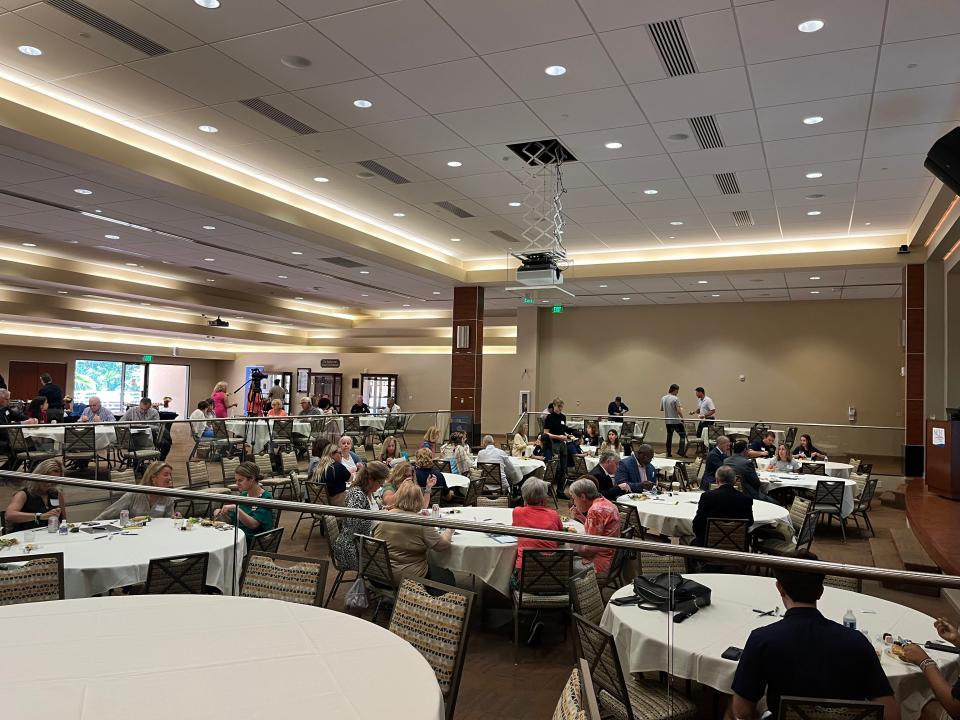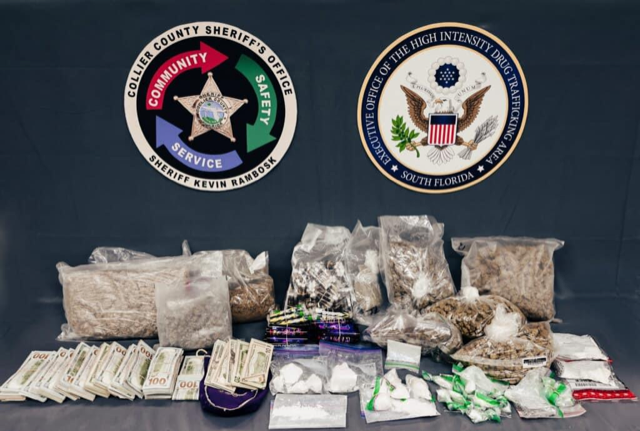Naples opioid summit: fentanyl destroys lives, can destroy community
The rally cries were crystal clear from Collier County’s top law enforcement officer to the founder of Orlando-based Project Opioid.
Fentanyl is the most potent and most deadly drug on the streets, as well as the one most able to destroy communities faster than any other drug.
“I believe the fentanyl problem will be the single most important fight over the next 10 years, not only in Collier but nationwide,” Collier County Sheriff Kevin Rambosk said at a first-ever opioid summit Wednesday,
Roughly 75 community leaders attended the event where the takeaway is that the community had better step up, get unified and act. The event was held at the Telford Education Center on the campus of the NCH Baker Hospital Downtown.

Organized by Naples Mayor Teresa Heitmann in partnership with the nonprofit Project Opioid, the half a dozen speakers brought perspective to what Southwest Florida and the country is facing and provided encouragement that something can be done.
According to Collier County emergency medical service calls, there were 665 overdoses in 2022, of which fentanyl accounted for 242 overdoses. In 2021 there were 696 calls and fentanyl was involved in 175 calls. In 2020, EMS responded to 550 overdose calls and fentanyl was responsible for 62 of the calls. The data can include deaths.
“We track the overdoses monthly and we have seen a rise in fentanyl,” said Tabatha Butcher, chief of the county’s EMS.
More:As Florida fentanyl deaths surge, state leaders and advocates disagree how to fight overdoses
Heitmann said the goal with the summit was to build awareness, educate and take action in concert with Drug Free Collier. The plan is to tap dollars for programs through opioid settlements between the state and opioid manufacturers for their significant role in the epidemic.
Attorney General Ashley Moody announced in January that Florida is receiving $365 million through two separate settlement agreements, the first for nearly $300 million with Johnson & Johnson and the second for $65 million from Endo Health Solutions Inc. Roughly 183 cities and counties signed on to the lawsuits.
Project Opioid founder and chief executive officer didn’t mince his words
Andrae Bailey, founder and chief executive officer of Project Hope, said fentanyl is in almost every drug on the streets in Naples and anywhere else.
Related:Public health agencies distributing Narcan in SWFL to help stop opioid overdoses
“You can use it one time, not know you are using it and wind up in the medical examiner’s office,” he said, referring to an overdose death. Seven out of 10 deaths from fentanyl involve young men.
The opioid epidemic has changed in recent years from a prescription pill crisis with rampant overprescribing to the current situation with illicit drugs like heroin. What is happening today is an overdose crisis driven by fentanyl.
“Fentanyl is the most dangerous drug we have ever seen in American history,” he said.
He offered five key things to know.
Fentanyl is still driving the opioid crisis. The key ingredient comes from China and gets smuggled into Mexico and is 20 to 60 times more potent than any opioid in the past.
It is killing young people in record numbers. More young people are experiencing depression and anxiety, pointing to smart phones and social media and how they are hurting young people. A consequence is young people are more susceptible to using drugs.
Old treatment models are not working. There needs to be treatment and protections in place that may not come from traditional rehabilitation centers when someone is having a bad day and at risk of relapse, he said.
2023 and next year offer the greatest time to solve the opioid crisis. Bailey spoke of the opioid settlements from manufacturers and how communities can tap the money for programs.
You can work together to solve this crisis. The people “in this room” can push to make treatment more available, he said.
How fentanyl looks today to better lure users
Dr. Joseph Pergolizzi, a Naples-based physician who is executive chairman of Drug Free Collier, spoke about the history of opioids and fentanyl, and where the epidemic has evolved to currently. Synthetic opioids, like fentanyl, are the top driver of overdose deaths today, he said. That’s based on the U.S. Drug Enforcement Administration, he said.
Drug dealers have made fentanyl look like candy in rainbow colors.
“They look like Skittles,” he said, referring to the chewy candy.
The DEA has launched public awareness campaigns with the most recent in September 2021 that says, “One pill can kill.”

“I have a lot of faith in this campaign,” he said.
In addition, funding for public health services has increased, he said. In 2022 roughly $16.5 billion went to the U.S. Department of Health and Human Services.
What did he offer as a solution to the epidemic?
Think national but act locally, he said.
A first-hand account: from addict to alumni at St. Matthew’s House
Jessica Betten, 38, shared her story of becoming a drug user as a teen and her 18-year struggle with addiction and getting to her sober date of Oct. 13, 2017.
Today she is the alumni director at Justin’s Place recovery program at St. Matthew’s House in Collier County.
The nonprofit offers a strict year-long addiction recovery program, in addition to being a homeless shelter and soup kitchen.
Related:Rezoning for mental health center in Collier County approved; neighbors plan legal action
Betten spoke of how at age 10 she started drinking and smoking marijuana.
When she and her family moved to Naples when she was 14, she got into trouble with the law within six months and entered into the juvenile justice system.
Her drug use continued even when she managed to finish high school and enrolled in college. She got into cocaine and switched to opioids and got pills by doctor shopping during college. She didn’t have the tools to stop using.
When she got pregnant she did stop using but went right back after her daughter was born.
“IV drug use brought me to my knees and I ended up in jail,” she said.
She ran into a friend at a local pharmacy who she said had a “light in her” and shared how Justin’s Place had helped.
Betten said she went into the David Lawrence Mental Health Center in November 2017 and Justin’s Place program for women in Alva. That’s where she found God and the support network she needed. She moved into the Wolfe Apartments, transitional housing in Golden Gate operated by St. Matthew’s House, and continued her education.
Today, she has her master’s degree in social work from Florida Gulf Coast University.
Her message to the audience.
“There is a way out,” she said.
This article originally appeared on Naples Daily News: Naples mayor organizes opioid summit for awareness, action

